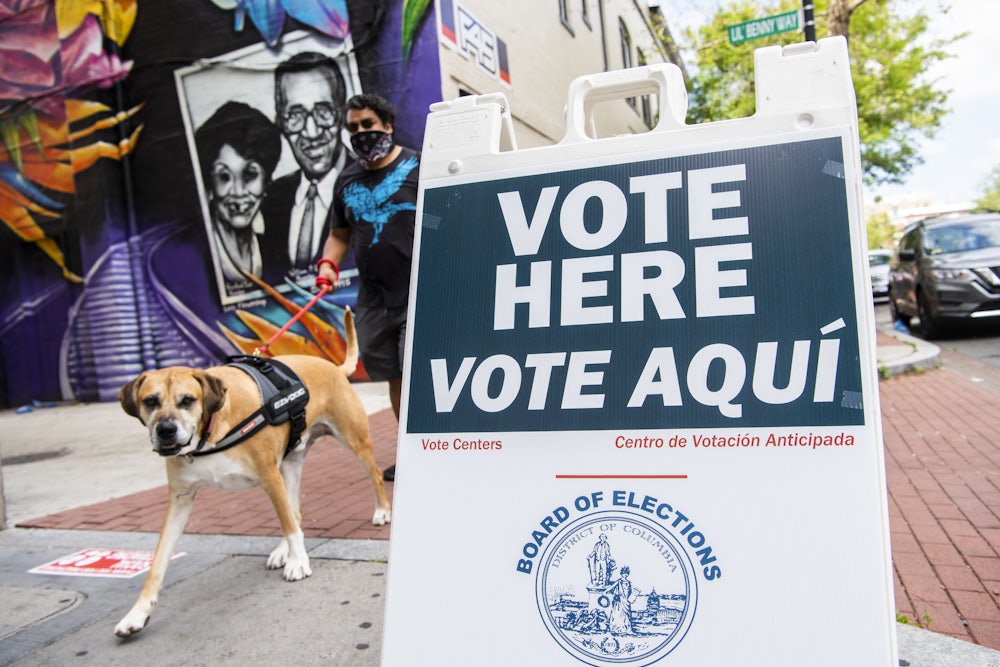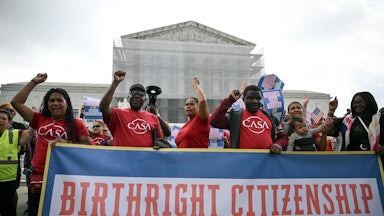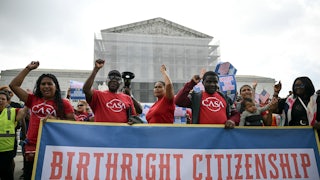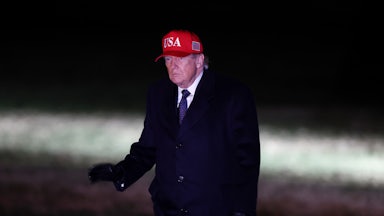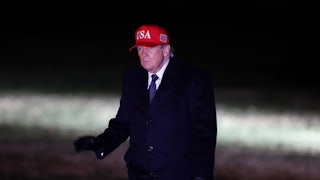Washington, D.C.’s city council approved a measure last week that would allow noncitizens to vote in local elections starting in 2024. The Local Resident Voting Rights Amendment Act of 2022 passed in a 12–0 vote (with one abstention) after multiple attempts to pass similar laws failed in recent years. If the bill is approved by Mayor Muriel Bowser, an estimated 50,000 noncitizens in the District could vote in races for mayor, city council, attorney general, the board of education, and advisory neighborhood commissioner, as well as for ballot initiatives.
The bill was drafted by Councilmember Brianne K. Nadeau, who framed it as a pro-democracy measure. “People who have decided to make the District their permanent home should have a hand in who represents them in government,” she said when she introduced the legislation last year. In a statement last week, Nadeau touted the bill as “critical legislation [that] will give a greater electoral voice to Black and brown D.C. residents and drastically increase immigrant communities’ political representation.”
The city council’s move is a well-intentioned effort to improve representative government in a city that is unfairly denied it at the federal level. At the same time, the D.C. bill is an egregious and unnecessary departure from basic American norms on citizenship and voting rights. Its expansive scope undercuts its proponents’ own arguments on letting a community’s established noncitizen residents have a voice in local governance. It is, in other words, the wrong solution to the right problem.
Noncitizen voting is rare in the United States today, but it is not unheard of. Some of the Maryland suburbs that surround D.C. have allowed it for years, and other major cities have experimented with it. New York City passed a similar measure last year that was later struck down by a state Supreme Court judge for violating the state constitution. Other localities are considering similar bills. A federal law passed in 1996 forbids noncitizen voters from casting a ballot in federal elections, so these measures can only apply to local races.
Proponents note that noncitizens were often able to vote lawfully in U.S. elections until the 1920s. While true, this opportunity was rarely unconditional. Some cities, for example, have historically allowed noncitizens to vote in school-board elections while they had children enrolled in the school system. This does not undermine the self-government principle but recognizes an exception that proves the general rule: Those with an immediate stake in a community’s governance should have a say in it.
At the same time, references to historical noncitizen voting practices often fail to reckon with the social and political contexts of the time. Noncitizen voting in the nineteenth century was often enacted to lure white male immigrants to settle new states and territories before the Civil War and to strengthen urban political machines after it. Opportunism, not altruism, was the defining trait here. And while Congress first set the conditions for naturalization in 1790, it did not centralize the process within a federal agency until 1906. State and local courts often typically handled naturalization petitions for the first century of American history, and the process was much speedier than it unfortunately is now. Noncitizen voting in the nineteenth century appeared to recognize that those it enfranchised were better understood as imminent citizens than anything else.
Proponents of noncitizen voting also often frame their arguments by centering immigrants who are long-standing members of a community. In a statement after the D.C. bill’s passage, Nadeau said that “those impacted by this bill have worked, sent children to school, and paid taxes in the District for decades without representation in government.” Some scholars of noncitizen voting have described them as “Americans in waiting” in the historical context. This point—and the argument in favor of expanding the franchise to noncitizens—is strongest when it comes to green card holders who have started the naturalization process.
But the bill in question does not work like this. It does not reward strong community ties or enfranchise only well-established residents of the district. The bill simply removes the citizenship requirement for casting a ballot and imposes no other conditions for noncitizens who wish to do so. Under existing D.C. law, prospective voters need only to have established residency in the district for 30 days before the election in question to qualify. The nation’s capital is more accustomed than most cities to seeing its residents come and go every few years, which is why its residency requirement for voting is so flexible by default.
If this bill becomes law, a Russian diplomat could live their entire life in Moscow or St. Petersburg, take a job as a cultural attaché at Russia’s D.C. Embassy in August 2024, move into their new apartment that September, and cast a ballot in D.C.’s local elections that November. Their vote would carry the same weight as anyone who has lived in the capital for two months, two years, or two decades. Even those who might be open to noncitizen voting in some contexts could take issue with extending the franchise so broadly as to include people with no conceivable stake in how a community is governed.
Some of the criticisms of noncitizen voting and its proponents are unfair or misguided, to be sure. The Washington Post’s editorial board, for example, warned the other day that adopting the bill “might be handing a political gift to the GOP just three weeks before the midterms,” apparently in reference to phantasmal fears of voter fraud committed by undocumented immigrants. The 2016 and 2020 elections have shown that most Republicans will make these accusations regardless of their veracity. Nor am I worried that the bill will “likely set back the cause of statehood” for D.C., as the Post claims. Opponents of D.C. statehood, by definition, weren’t very interested in respecting the representative power of D.C.’s citizen residents to begin with.
The conceptual problems with noncitizen voting, however, cannot lightly be set aside. Voting and citizenship are two sides of the same coin in this country. Those who belong to a particular community get to decide how that community is governed. Those who aren’t part of that community, conversely, do not generally get a say in its governance. This is an essential feature of self-government for any political system—it is the “self” that governs. Supporters of noncitizen voting agree with this principle; they simply argue that U.S. citizenship does not currently encompass everyone who lives in a certain place who has a justifiable stake in how it is run.
Making citizenship more speedily attainable is a more durable and holistic solution than merely divvying up the rights associated with citizenship in a piecemeal fashion. It is also a solution that many Americans already support. Citizenship, after all, is also more than just the vote: It includes the right to participate in juries, to run for elected office, and to reside forever within the U.S. It is understandable that proponents of noncitizen voting want to avoid the creation of a permanent underclass in this country. But I am skeptical that noncitizen voting can solve this. If anything, creating a tenuous, second-class version of pseudo-citizenship seems only to accept and entrench that reality.
